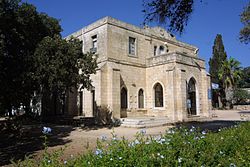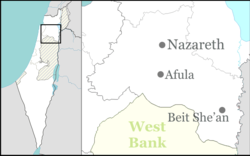Bethlehem of Galilee
|
Bethlehem of Galilee בֵּית לֶחֶם הַגְּלִילִית |
|
|---|---|
 |
|
| Coordinates: 32°44′11.85″N 35°11′28.72″E / 32.7366250°N 35.1913111°ECoordinates: 32°44′11.85″N 35°11′28.72″E / 32.7366250°N 35.1913111°E | |
| Grid position | 167/237 PAL |
| District | Northern |
| Council | Jezreel Valley |
| Affiliation | Moshavim Movement |
| Founded |
Bronze Age (ancient town) 1906 (Templer colony) 1948 (moshav) |
| Population (2015) | 777 |
Bethlehem of Galilee (Hebrew: בֵּית לֶחֶם הַגְּלִילִית, Beit Lehem HaGlilit; lit. "the Galilean Bethlehem") is a moshav in northern Israel. Located in the Galilee near Kiryat Tivon, around 10 kilometres north-west of Nazareth and 30 kilometres east of Haifa, it falls under the jurisdiction of the Jezreel Valley Regional Council. In 2015 it had a population of 777.
The modern moshav is located at the site of the ancient Israelite settlement known as Bethlehem of Zebulun or Berlehem Zoria. The town existed as Christian settlement in the classic era and was populated during the Middle Ages. It was reestablished as a Templer Bet Lam colony in the 19th century and turned into Jewish moshav in 1948.
To distinguish the city from the city of Bethlehem near Jerusalem, it was originally known as Bethlehem of Zebulun, whilst the town near Jerusalem was called "Bethlehem of Judea." In the Jerusalem Talmud it is referred to as Beth Lehem Zoria, as it was part of the kingdom of Tyre at the time. According to the Book of Judges, one of the so-called "Minor Judges" of early settlement Israel, Ibzan, came from Bethlehem and was buried there. The Cambridge Bible for Schools and Colleges suggests that the Bethlehem referred to in this passage is Bethlehem of Galilee "rather than the more famous Bethlehem in the Tribe of Judah".
Until the late 19th century, ruins of a church and a synagogue could be seen there, and archaeological findings "from the early Roman Period" show, it was a prosperous city. So the biblical Bethlehem of Zebulon is "identified" by archaeologists with today's Bethlehem of Galilee.
...
Wikipedia

